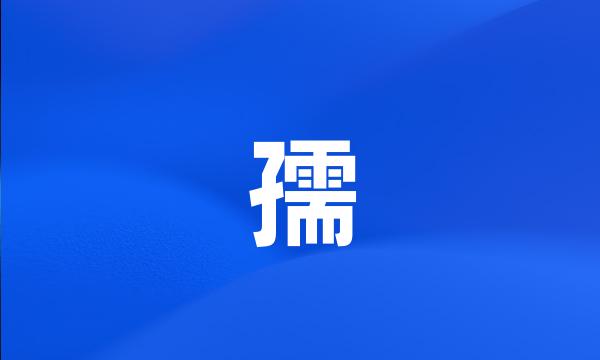孺
- 名Ru;child
 孺
孺-
小孩子,幼儿:~子。~慕(幼童对父母的爱慕,泛指深挚的敬爱或仰慕)。~子牛。妇~皆知。
- [名]
- 1
(小孩子) child:
-
妇孺
women and children
-
- 2
(姓氏) a surname:
-
孺悲
Ru Bei
-
-
期待未来孺廊和碧波继续交流与合作!
We look forward to collaborating with them in the near future !
-
老孺人怅怅地高声叫喊说,那个女店员欺骗了她。
The elderly woman angrily exclaimed that she had been cheated by the shop girl .
-
街上有穿着和服的小女孩和老妇孺,也有穿着西方服饰的年轻女孩,都融合在熙熙攘攘的人群里。
Little girls and elderly ladies in kimonos rubbed shoulders with teenagers and women in western dress .
-
传话的人出门以后,孔子取出瑟来边弹边唱,故意使孺悲听到。
As soon as the go-between went out of the door , he took his zither and song to it so that the former might hear him .
-
孔子(公元前551年~公元前479年),名丘,字仲尼,鲁国陬邑(今山东曲阜东南)人,孺家创始人,被后世尊称为“圣人”。
Confucius ( 551 B. C. ~ 479 B. C. ) , born at Zouyi ( south-east of the present Qufu , Shandong Province ) , whose given name was Qiu and courtesy name Zhongni , was the founder of Confucianism .
-
梁启超在风雨飘摇的晚清时代,倡导小说界革命,主张以小说启蒙童孺,救国新民,赋予小说以崇高的政治使命,同时提出小说为文学之最上乘的口号。
Liang Qichao who promoted the revolution in the novel circle and held that it could enlighten children and save the nation bestowed a sublime mission on novel , meanwhile he put forward a slogan that the novel was the best literary form from then on .
-
本文通过分析牛僧孺的散文作品,综述他在党争活动之外的古文观点、散文创作活动,尤其与韩愈、柳宗元等古文家的密切关系,由此评价他在唐代古文运动中的地位。
An analysis of his prose theory , prose writing and political activities shows that Niu Seng-ru kept close connection with the famous ancient prose writers , such as Han Yu , Liu Zong-yuan , especially enjoys an important place in the classical prose movement in the Tang Dynasty .
